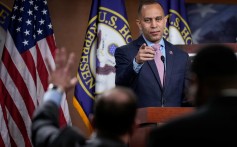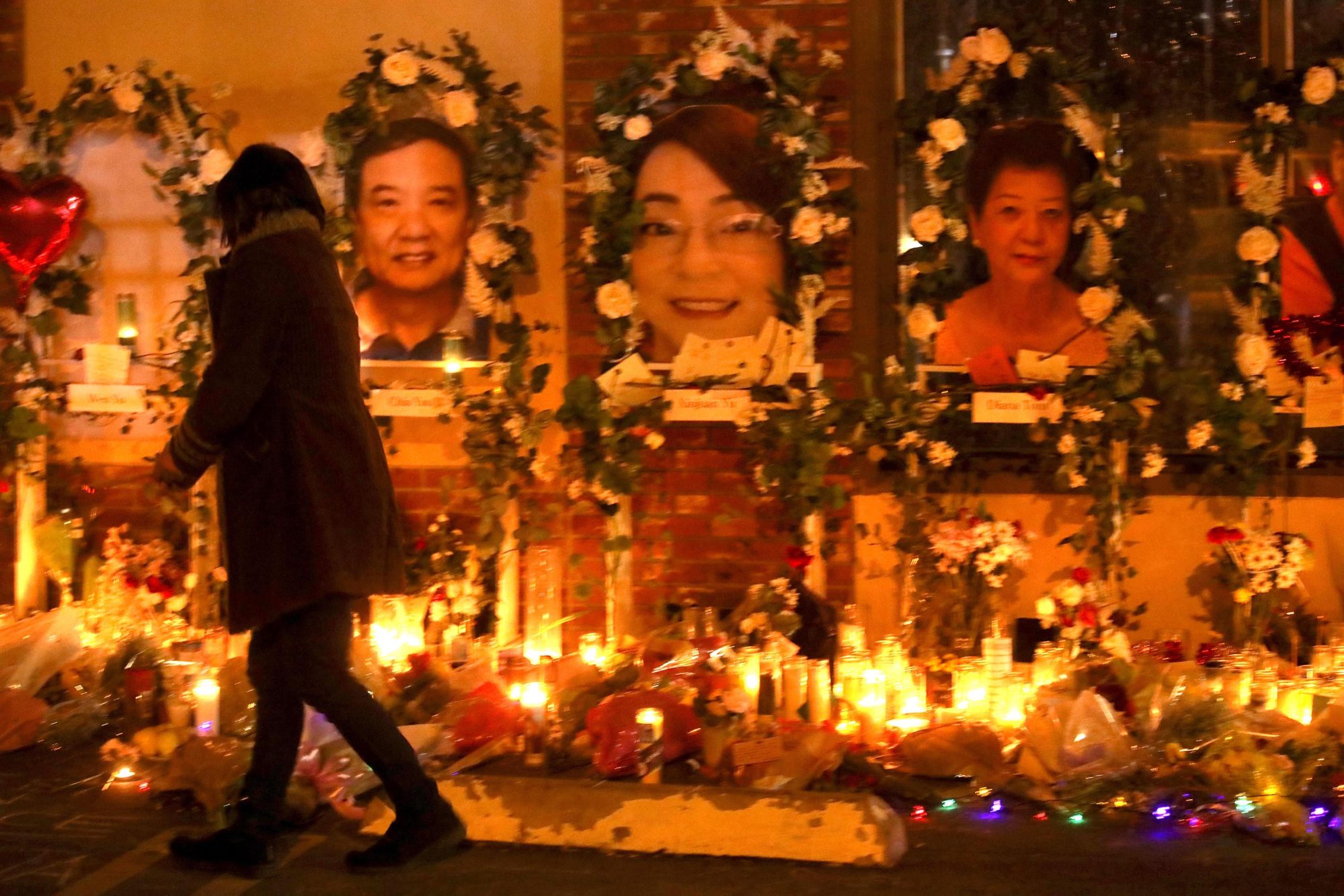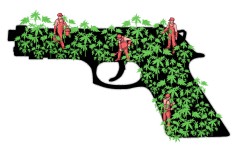Recent attacks in which Asian-Americans were both victims and suspects have elicited a special pain and a search for answers within the community
‘Negative exposure to American culture’ and rise in gun-buying over anti-Asian violence pose challenges, observers say
Bochen Han
+ myNEWS
Published:4 Feb, 2023

People gather at a vigil in Half Moon Bay, California, on January 27, days after a mass shooting took place at two farms in the community. Photo: San Francisco Chronicle via AP
“Why would Chinese people ever shoot Chinese people?”
That was how Duan Fuxiang, 89, of Manitoba, Canada, reacted when her granddaughter informed her of the recent mass shootings in California. The two tragedies coincided with Lunar New Year, a two-week festival ending this weekend and normally a time of celebration in Chinese and other Asian communities.
The first one, on January 21, took place at a dance studio in the predominantly ethnic Asian city of Monterey Park, where 11 victims, all of Asian descent, died. The second, less than 48 hours later and some 400 miles away in Half Moon Bay, happened at two mushroom farms filled with Chinese and Mexican workers.
Both suspected gunmen were Chinese immigrants. Both were over 65.
Americans are no strangers to mass shootings, and violence and discrimination against Asian-Americans have skyrocketed since the start of the coronavirus pandemic.
But multiple attacks in which Asian-Americans were both victims and suspects – and where the accused are elderly men – have elicited both a special kind of pain and a search for answers within the Asian-American community.
The superficial similarities in the two suspects’ backgrounds led to a comparison with David Chou, a 68-year-old Chinese-American who opened fire at a Taiwanese church in Laguna Woods, California, less than a year ago.
Two marks a coincidence, three signifies a pattern, as popular thinking goes. But Min Zhou, a professor of sociology and Asian-American studies at UCLA, cautioned against concluding that Asian elders committing violence in the US was a trend.
Instead, a “negative exposure to American culture” or “bad assimilation” was noteworthy, she said, referring specifically to American gun culture.
Many observers agree that what has transpired bears the traits of a uniquely American story: immigrants navigating a new world where social alienation and the world’s largest supply of privately owned guns make it all too easy for rage and despair to manifest as mass violence.
“There are angry, dislocated, disenfranchised people everywhere in the world,” said Eileen Chow, an associate professor in Chinese and Japanese cultural studies and founding member of the Asian-American and diaspora studies programme at Duke University.
10 Democrats, led by Asian-American, named to US panel on China
3 Feb 2023

Yet “in the US, a 72-year-old can take out 20-some people in 10 seconds of shooting”, Chow said.
California has some of America’s strictest gun laws, but experts have said there are too many firearms in the country to completely prevent gun violence in any given state. An estimated 393 million guns are privately owned across the US, whose population totals about 333 million people.
Zhao Chunli, 66, the suspected gunman in Half Moon Bay, reportedly told investigators that workplace disputes spurred his actions. Huu Can Tran, the 72-year-old shooting suspect in Monterey Park, had accused his family of theft, fraud and attempting to poison him.
In all, 20 people were shot in Monterey Park, 11 of whom lost their lives. Seven people were killed in Half Moon Bay, with an additional person injured.
Chow said surprise over Asian-on-Asian violence was misplaced. Such violence was “not so uncommon”, and mass shootings might happen in China if people there had greater access to guns, she added.
While Asian-Americans have historically purchased the fewest guns compared to other demographic groups in the US, according to a 2021 survey by Pew Research Centre, they have been buying more firearms in the last few years.
Chow attributed the rise in gun-buying within the community partly to media coverage of anti-Asian violence.
“Why do people buy guns? Because they were reading over and over again that they’re being attacked.”
Scholars like Sylvia Chan Malik, an associate professor of women, gender, and sexuality studies at Rutgers University, have highlighted Chinese elders as particularly vulnerable to radicalisation given the high levels of misinformation in some Chinese media outlets and often limited access to English-language alternatives.
Meanwhile, Stop AAPI Hate, a San Francisco-based non-profit organisation formed in the wake of increased violence against Asian-Americans and Pacific Islanders at the pandemic’s outset, recorded almost 11,500 hate incidents towards the community between March 19, 2020 and March 31, 2022.
Duan’s son, Wang Guqi, 62, lives in Charlotte, North Carolina, and has been closely following the shootings in California and their aftermath, discussing them with his fellow Chinese-Americans.
As his feelings of insecurity spiked in recent years, Wang considered buying a gun and even attended a gun exhibition. He ultimately decided against it because he lacked sufficient time to learn how to use one.
Wang, originally from Jiangxi province, believed his fellow elders did not learn how to “forgive” others because they spent their formative years in the midst of China’s Cultural Revolution, which lasted from 1966 to 1976.
By Wang’s account, amid the “class struggle” in which they grew up, employees were pitted against employers, and violence was considered an appropriate option to resolve conflict.
When they come to the US, it can be difficult to shed those past ways because they do not fully assimilate into mainstream American society, Wang said. He was not surprised that the gunmen targeted members from their own community, noting “Chinese people are surrounded by other Chinese people”.
Nor did Wang believe the suspects harboured any particular affinity for guns. The salient point was gun access, he said. “They use whatever they are familiar with to address their issues.”

A woman pays her respects at a memorial for 11 people who died in a mass shooting in Monterey Park, California, on January 26. Photo: Los Angeles Times/TNS
Zhou of UCLA said a lack of community support likely contributed to the circumstances leading to the two tragedies. Many immigrants, especially elders, do not know how to deal with their mental health issues.
“Normal social networks are disrupted through migration,” she added. “When people repeatedly face discrimination, stereotyping and if they lack support in their community, things could go bad”.
Asian-American elders experience significantly lower life satisfaction and receive less emotional support than their peers of other racial backgrounds, according to a 2022 study based on 2018 data published in the Journal of the American Board of Family Medicine.
The Half Moon Bay shooting stood out to Chow because “these are all working elders … I was like, ‘wow, we really have immigrants working into their old age for survival’”.
Jeanie Chang, chair of the board of the Asian Mental Health Collective, said Asian elders are very new to mental health conversations, even though the stigma around mental health has gradually lifted for younger Asian-Americans.
“In the whole life cycle, they’re all about giving, giving their wisdom, extending their own knowledge of life,” Chang said of many Asian elders’ state of mind. “They’re not there to necessarily receive it.”
Confucian values could also discourage them from talking about conflict for the sake of maintaining peace, she added.
The shootings cast a shadow over Lunar New Year celebrations that began on January 22 and end on Sunday. Some observers have said the annual holiday could also have been a trigger for the shootings.
Chang, who is a licensed family therapist, noted that her consultations and appointments surge in number during holidays, which she said were full of joy yet also “extremely stressful”.
Chow of Duke said the shootings were “meant to inflict maximum damage”.
“Maximum damage is when people are happiest and at a place when they are happiest,” she said.
But ultimately, no single factor could explain these attacks, Chow believed. “It’s just structural,” she said. “Frankly this is an American phenomenon, an American story.”


No comments:
Post a Comment